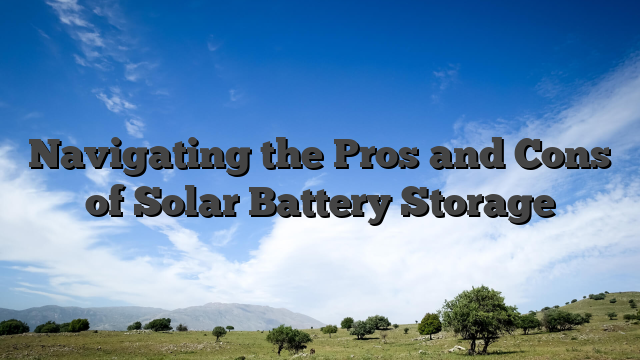Solar energy is a crucial aspect of powering homes and commercial structures. It is one of the most rapidly growing sustainable energy sources. Using solar batteries to store energy from the sun increases energy availability for later use. Solar battery storage is an effective method for collecting and storing extra solar-generated power, which offers a range of considerations. Therefore, it is essential to comprehend the advantages and disadvantages of solar battery storage to adopt sustainable energy solutions record of the mightiest lord chapter 1.
Navigating the pros and cons of solar battery storage involves considering a range of factors that can impact its feasibility and benefits for individual users. On the positive side, solar battery storage addresses the issue of intermittency associated with solar energy generation. By storing excess energy when the sun is shining and releasing it when needed, solar battery systems increase self-consumption and reduce reliance on the grid, potentially leading to significant savings on electricity bills. This can be particularly advantageous in regions with time-of-use pricing or areas prone to power outages, as solar batteries can provide backup power during emergencies.
However, there are also some drawbacks to consider. Cost is a notable concern, as solar battery systems can involve a substantial upfront investment, including the cost of the batteries themselves, installation, and maintenance. While prices have been decreasing over the years, the initial expense might not always justify the savings, especially in areas with relatively stable grid services and low electricity costs. Additionally, the efficiency and lifespan of batteries can vary, impacting the overall return on investment. Some battery technologies degrade over time and may need replacement after a certain number of cycles, which should be factored into the cost analysis law of reincarnation raw.
Pros of solar battery storage
Solar battery storage systems offer a range of benefits that enhance the efficiency, reliability, and cost-effectiveness of solar energy usage. One key advantage is their ability to store excess energy generated by solar panels during sunny periods. This stored energy can then be used during cloudy days or at night, allowing homeowners and businesses to maximize their self-consumption of solar power and reduce their reliance on the grid. This not only enhances energy independence but also helps to lower electricity bills by avoiding peak-hour rates and reducing the overall grid consumption.
Additionally, solar battery storage can serve as a backup power source during grid outages, ensuring a continuous power supply for critical appliances and maintaining essential services. This reliability is especially valuable in areas prone to extreme weather events or unreliable grid infrastructure.
Another significant benefit of solar battery storage is its potential to contribute to a more stable and resilient grid. By enabling distributed energy resources, such as solar panels and batteries, to supply power locally, battery systems can alleviate stress on the central grid during times of high demand omgblog.
This can lead to a reduction in the need for costly grid infrastructure upgrades and maintenance. Moreover, battery storage can play a crucial role in supporting the integration of renewable energy sources into the grid, as it can smooth out fluctuations in solar energy production due to weather variations. This improves grid stability and enables a higher penetration of clean energy, ultimately contributing to a more sustainable and environmentally friendly energy system.
The first thing to consider between the pros and cons of solar battery storage is its advantages. The following is the long list of advantages of installing solar battery storage:
- Solar battery systems have a long battery life
- Solar batteries are an effective way to contribute to increased energy independence.
- Solar batteries contribute to sustainable energy and are a great means of reducing costs.
- Solar batteries help store a surplus amount of solar energy for later use.
- Solar batteries are beneficial during various environmental conditions because of their reliability and durability.
Cons of solar battery storage
Solar battery storage has gained popularity as a promising solution to address the intermittent nature of solar power generation. However, it’s important to recognize that there are also notable disadvantages associated with this technology. Here are two paragraphs outlining some of the cons of solar battery storage:
- Initial Cost and Payback Period: One of the primary drawbacks of solar battery storage is its substantial upfront cost. The installation of a solar battery system, in addition to a solar panel setup, can significantly increase the initial investment required for transitioning to solar energy. While prices have been decreasing over the years, the purchase and installation of high-quality batteries remain relatively expensive. This can deter many homeowners and businesses from adopting solar battery storage, especially in regions with lower electricity prices. Additionally, the payback period for these investments can be lengthy, making it difficult for consumers to recoup their initial costs. In many cases, it might take several years or even a decade for the savings on electricity bills to offset the expenses associated with purchasing and installing the batteries.
- Limited Energy Storage and Efficiency Concerns: Another notable drawback of solar battery storage is its limited energy storage capacity. Batteries are currently not capable of storing large amounts of energy for extended periods, which can be problematic during prolonged periods of low sunlight or high energy demand. This limitation becomes more significant as the scale of energy storage increases. Additionally, energy storage systems have inherent efficiency losses. When energy is stored and then discharged, some of it is lost as heat and during the conversion processes. This inefficiency reduces the overall effectiveness of solar battery systems and can impact the economic viability of adopting them. As battery technology continues to evolve, these efficiency concerns might be mitigated to some extent, but they remain a challenge to overcome.
Solar battery storage also has certain disadvantages that must be considered, following which you can determine the difference between the pros and cons of solar battery storage. The following is the list of solar battery storage disadvantages:
- Purchasing solar energy requires an upfront investment.
- Solar batteries can give rise to certain electrical hazards if not installed properly.
- A large amount of space is required for the solar battery installation.
Conclusion
The need for solar energy is rising continuously. Individuals looking for solar energy batteries to save their expenses and increase independence can get in touch with EP Cube for high-quality solar batteries. The smart gateway assists in converting more solar power into electrical energy for energy storage. With EP Cube, you can automatically store electricity from the grid and save money by storing it for later use.



